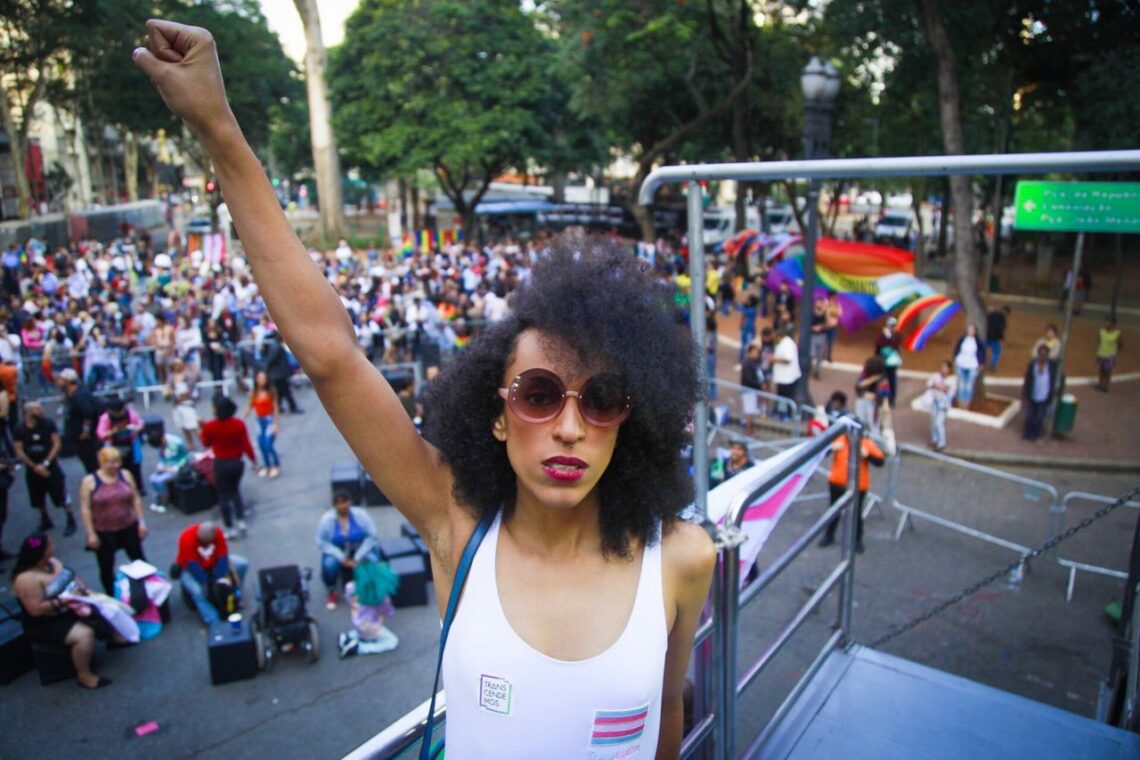“Despite setbacks, we are building new benchmarks of civility.”
Human rights activist, Black travesti, and eloquent politician — this is Erika Hilton, the first Black trans person to take a seat in Brazil’s Chamber of Deputies and lead a parliamentary bench in Congress. A member of the Socialism and Liberty Party (PSOL), Erika has spearheaded a political movement that combines pressing public interest issues with cultural initiatives and social mobilizations.
In just two years, she has championed causes such as equal marriage rights, abortion access, and ending the 6×1 work schedule. On social media, she is celebrated for blending fashion, music, and popular culture into her political discourse, making complex debates more accessible. Today, she is a breath of fresh air in Brazil’s political paradigm — a country notorious for its alarming rate of violence against trans and Black people.
Travesti is a transfeminine gender identity unique to Latin America, including Brazil, with distinct cultural aspects. Some travestis, like Erika, also identify as trans women. Others, like me, see themselves as a “third gender” or part of the nonbinary spectrum.
Who is Erika Hilton?
“It’s important to remember that 90% of trans women and travestis are forced into sex work because they are expelled from their homes and excluded from the job market.”
Erika, in an interview with Agência Brasil, 2023.
Born in Franco da Rocha, São Paulo, in 1992, Erika grew up in the outlying ghettos of Francisco Morato, part of São Paulo’s metropolitan area. During her early teens, she was sent to live with relatives in Itu, another town in São Paulo’s interior, where she faced repression due to her identity.
Compelled to attend church, her family believed only God could “cure her,” as if her identity were the result of some “demonic affliction.” Amid family violence, Erika was expelled from her home at fifteen and turned to sex work to survive. It was among other travestis that she found solidarity and refuge during this vulnerable time.
Years later, Erika reconciled with her mother, who welcomed her back, allowing her to complete her basic education. She then enrolled in pedagogy and gerontology programs at the Federal University of São Carlos (UFSCar). It was there she launched her political career, aligning with student movements and creating a program to help trans people and travestis access public universities.
Political Career

“It’s essential to create openings to help minimize the harm caused by current policies. A fully inclusive policy is still far off. Sometimes, the maximum can seem like the minimum, but the minimum, for those who have nothing, is already a lot.”
Erika Hilton, 2021, upon receiving the Generation Change Award at the MTV European Music Awards for her political activism.
In 2016, Hilton joined PSOL and ran unsuccessfully for City Council in Itu. Two years later, she participated in a collective candidacy, sharing a mandate until 2020, when she decided to run for São Paulo’s City Council. Garnering over 50,000 votes, she became Brazil’s most-voted city councilor and the first trans woman to hold the position in São Paulo. In 2022, she made history again, becoming the first Black travesti elected to Brazil’s Federal Chamber of Deputies.
Her political achievements have earned her numerous national and international accolades, including being named one of Time magazine’s “Next Generation Leaders,” the UN’s “Most Influential People of African Descent,” and BBC’s “100 Most Inspiring and Influential Women in the World.” She was also recognized as Brazil’s best federal deputy in 2024.
Social Impact

“When life took away my chance to become a model and pushed me to the margins, it called me to join the fight of my ancestors to build dignity for my community. I accepted this call with honor and joy. Later, I realized I could intersect these paths; I didn’t need to abandon the dreams of that young girl to become just one thing. In fashion, I found a way to hack politics — a space that is reactionary, uninspired, and aesthetically careless.”
Erika Hilton, in an interview with Glamour, 2023.
On social media, Erika Hilton has become an icon, with supporters affectionately calling her “mother” and “diva.” One of her most celebrated initiatives is collaborating with pop music fandoms to advocate for political issues, pressuring politicians and mobilizing large crowds for street protests. This strategy has made her one of Brazil’s most effective youth mobilizers.
Her impact is so profound that even families — mine included — report changing their perspectives on LGBTQIA+ people thanks to her influence. After expelling me from home in August, my parents reconciled with me in November, inspired by Erika’s work. “Oh, my daughter, I’ve missed you so much,” my father said over the phone — a sentiment I’d never felt before. And I am not alone: social media is replete with similar accounts of her transformative influence.
With such an illustrious trajectory, Erika is already gaining public support for a potential presidential run. However, she is currently ineligible due to not meeting the minimum age requirement of 35. Skeptical about this possibility, Erika says that the groundwork is still being laid and that there is much to accomplish in the meantime.
Regardless of the path she takes, Erika Hilton represents the pinnacle of what travesti resistance can produce: eloquence, elegance, and, above all, change.

